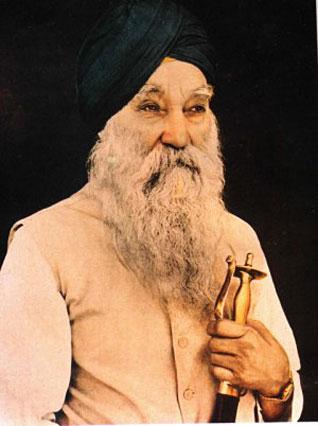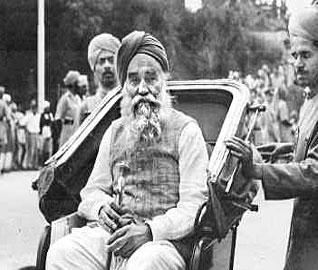Our Heroes
Master Tara Singh:
Freedom Warrior
by I.J. SINGH
This week marks the beginning of the 125th anniversary year of the birth of TARA SINGH [June 24, 1885 -November 22, 1967].
A life well and fully lived.
Tara Singh, who became the dominant figure of Sikh political scene in the twentieth century, was born a Hindu. His interest in Sikhism awakened when a boy and he formally converted to Sikhism at age 17, along with his elder brother and a cousin.
At Khalsa College, he developed an abiding interest in politics. He was the President of the Students Agitation Committee during the Sikh resistance to attempts by the British government to exert greater control over the Khalsa Colleges.
At graduation from Teachers Training College at Lahore, he offered his services at the nominal income of 15 rupees a month if a new Khalsa school was opened in Lyallpur. The offer was accepted and he became headmaster of the school. Thus, he acquired the honorific "Master."
In 1921, his involvement in politics took a serious turn. It was the time of the totally non-violent Sikh agitation to wrest control of the historic gurdwaras from the corrupt managers appointed by the British government.
He was arrested several times. This battle was won.
Shiromini Gurdwara Parbandhak Committee (SGPC) was formed in 1926, and he became its Vice President.
The SGPC worked intimately with the dominant political organization in India, the Congress Party, in the non-violent agitation for India's freedom and Tara Singh repeatedly spent time in jail. While interned, he was elected President of the SGPC.
Tara Singh retained control of the SGPC as well as of its political arm, the Shiromini Akali Dal, until 1962.
From the 1930's until the end of his days, Master Tara Singh was involved in political activism - termed "agitation" in Indian independence movement parlance - almost without break.
First, it was against the British for the control of gurdwaras and appropriate legislative representation for Sikhs.
After Indian independence from the British in 1947, his energies shifted to agitation against the Indian government's decision not to allow a Punjabi-speaking state in Punjab. Master Tara Singh won this war of attrition; a Punjabi Suba was formed in 1966, years after much of India had long been reorganized on a linguistic basis.
But, the governing Congress Party - which had already reneged on its promises to the Sikhs during the Independence struggle - was successful in giving but a freshly and further truncated shadow of a Punjab that had already lost half of its territory to Pakistan in 1947.
It was not an easy struggle. Several agitations were launched and headed by Master Tara Singh from 1955 to 1966. He spent time in jail, along with tens of thousands of Sikhs who courted arrest.
The most painful period of his life was around 1947, when India became independent of the British.
In the years before 1947, the fate of minorities like Sikhs and Muslims hung in the balance. After initial reluctance, the Muslim minority settled for an agreement with the Congress Party and partition of the country into India and Pakistan ensued.
As the smallest of the three communities, Sikhs relied on India's assurances of a fair deal in a free country - an area in which Sikhs, too, would be able to "bask in the glow of freedom." But these promises were soon forgotten. And Sikhs have become part of an India whose Constitution saved a few drops of ink and a line or two of text by mischievously lumping them together, along with other minorities, as Hindus.
This is a nation in which nascent Hinduism and their ethos - Hindutva - continues its steady march to diminish all minorities.
Master Tara Singh has been energetically villified by more than a generation of Sikhs for perhaps being too naïve or gullible during negotiations with the British and Indian leaders on the needs of the minority communities that made up India.
Perhaps Sikh leaders were indeed not sufficiently wily or alert.
Keep in mind, though, that they were negotiating with British statesmen of the first rank, and Hindu leaders like Gandhi and Nehru - the products of a first-rate British education. And Sikh leaders like Master Tara Singh were merely college graduates with limited or no experience with the sophisticated world around them.
Not that one can blame more astute adversaries for one's losses, but history tells us that Sikhs and Master Tara Singh were blindsided.
Yet, Sikhs leaders did smell a rat, and refused to endorse the Constitution of India in 1950.
The irony of this shines through when one realizes that of all the people imprisoned for life or sentenced to death during India's struggle for independence, fully two-thirds were Sikh. And Sikhs have never been more than 2% of India's population.
Master Tara Singh's heart was in the right place.
He died in 1967.
He deserves an honorable place in the annals of the tumultuous 20th century.
June 22, 2009
Conversation about this article
1: Raj (Canada), June 22, 2009, 3:43 PM.
Hmmm ... The reason we were and are in this mess is because of leaders like Master Tara Singh. Few questions do arise in one's mind about the failure of leadership that are directly related to Master ji. Why did he accept the division of Punjab, when other options such as common custody was available? Why didn't he insist on a civilized movement of the masses during some type of probation period under British before Independence? Why didn't he negotiate dual citizenship for every Sikh born on either side of the border? Why wasn't an offer from Mr. Jinnah (to join Pakistan) even considered by him, which was sent to Akali leadership through Sardar Hari Singh? Why did he rip off and tear the flag of the Muslim League in Lahore? This started the killings of Sikhs and Hindus, and the reprisals. He was the darling of Jalandhar's Hindu press. These are reasons often cited as having contributed to the Partition of Punjab.
2: Harry Singh (Kuala Lumpur, Malaysia), June 23, 2009, 2:07 AM.
Although his work and dedication is much appreciated, I have concerns over some of his blunders. For example, is it true that he rejected the offer by Dr. B.R Ambedkar, the leader of the Dalits, that all of the latter, en masse, convert to Sikhism? Also, I think he failed to ensure that Sikhs were clearly identified as a separate relgion in India after Independence.
3: G.C. Singh (U.S.A.), June 23, 2009, 1:18 PM.
Master Tara Singh was an honest and sincere leader in the history of Sikhs. However, as pointed out by Dr.I J. Singh, he was from a simple background and was no match for the cunning and sophistication of the Hindu leaders like Nehru and Gandhi and their geopolitical vision. They promised everything to the Sikhs and later betrayed them the moment they got power in their hands. The first order of priority for the Hindu leaders was disarming the Sikhs. I think the Punjabi Suba movement and the Anandpur Sahib resolution was a huge mistake. Having already seen the treachery of the Hindu establishment, the unambiguous and immediate demand after partition should have been a call for sharing of political, economic and military power with the Sikhs as a third major force on the Indian subcontinent. In spite of some symbolism, nothing in India has changed and we are as vulnerable as we were in 1984. The Sikh nation must realize its God-given right to self-defence by having effective levers of military power in their own hands. Without arms in India, you are like a lamb waiting to be led to a slaughter house.
4: H. Singh (Los Angeles, U.S.A.), June 24, 2009, 1:21 AM.
Despite suffering ongoing and severe obstacles, Sikhs are very well integrated in all societies. In every aspect, in every enterprise, at every level, in every corridor of power: leaders everywhere!
5: Jagdeep Singh (London, U.K.), July 24, 2009, 12:58 PM.
Interesting comments highlighting the fact that Masterji was not an astute leader. The Cripps mission had patitioned India in a manner that would shift the entire Punjab to Pakistan. Master Tara Singh's refusal and subsequent agitation after he was arrested, prevented this! On the subject of dalits, unlike Christians and Muslims, Sikh Dalits get prefrential treatment when it comes to government jobs under the controversial quota system in India. This was negotited by Master Tara Singh, otherwise we would have seen many Sikhs convert out of the faith.
6: Zubair (Islamabad, Pakistan), March 22, 2010, 4:26 AM.
Sikhs have to decide whether they are Punjabis with a distict culture, language and lifestyle of their own, or they are a religious group separate from Hindus and Muslims. The integration of Sikhs in India is happening at the cost of their identity. A 'good' Sikh in the new India appears to be one who ceases to be a Sikh. It is for this reason that there are more Sikhs in England and Canada holding on to their tradition and culture than in India. What happened in Delhi and then in Amritsar and the Golden Temple goes to show how they are viewed during critical times.





